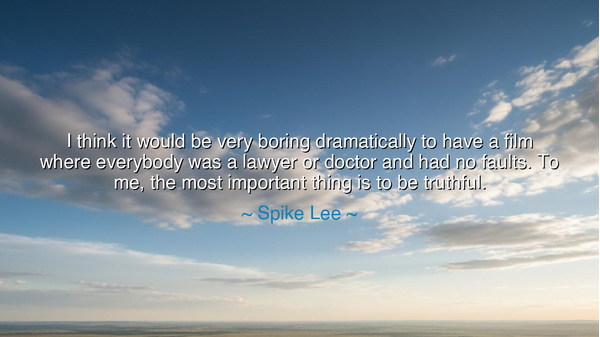
I think it would be very boring dramatically to have a film
I think it would be very boring dramatically to have a film where everybody was a lawyer or doctor and had no faults. To me, the most important thing is to be truthful.






In the words of the seer of cinema, Spike Lee, there resounds a truth that has crossed ages and disciplines: “I think it would be very boring dramatically to have a film where everybody was a lawyer or doctor and had no faults. To me, the most important thing is to be truthful.” This is not merely the reflection of a maker of films—it is the declaration of one who has looked into the soul of humanity and found that the essence of drama, art, and even life itself is imperfection. For if the world were made of beings flawless and without weakness, who would care to hear their tale? A sky forever cloudless and a sea forever calm may seem serene, yet in time it grows monotonous, and the heart yearns for the storm that proves the sailor’s strength.
From the beginning of the human story, the greatest heroes were not carved from the cold stone of perfection, but from the warm clay of struggle. Achilles was mighty, yet wrathful; Odysseus was clever, yet prone to pride. Their stories endured not because they were gods untouchable, but because they bore faults that mirrored our own, and through those faults, they became real to us, their victories brighter, their losses more grievous. So too does Spike Lee remind us that the stage of life, whether lit by the lamp of theater or the camera’s lens, becomes lifeless if it denies the cracks, the stumbles, the shadows.
Consider the tale of Abraham Lincoln, a figure often elevated to marble-like grandeur. Yet behind the statue was a man haunted by melancholy, plagued by self-doubt, even mocked for his appearance. It was not in spite of these weaknesses but through them that he found the humility to listen, the patience to endure, and the courage to act when the nation was fractured. His story, like the films Spike Lee envisions, is made great because of its truthfulness, for truth lies not in the mask of perfection but in the nakedness of vulnerability.
And let us not forget the realm of art itself. In the Renaissance, Michelangelo left unfinished sculptures, figures half-emerging from stone. Many lamented their incompletion, yet generations came to revere them as the Prisoners, embodiments of humanity itself—forever striving, never fully freed from imperfection. Would they have spoken so powerfully if polished to flawless smoothness? Nay, it is their roughness, their incompleteness, that awakens in us a recognition of our own unfinished journey.
What Spike Lee declares, then, is more than artistic preference; it is a philosophy of life. To demand perfection from stories—or from people—is to strip them of their pulse. To honor the cracks and shadows is to honor the truth. For only in truth does art stir the soul, only in honesty does it inspire, only in imperfection does it reveal the splendor of becoming. A film where all are saints and sages is no film at all, but a lifeless fable, without the fire of reality.
The lesson for us is plain, though not easy: we must cease fleeing from our faults, and instead weave them into the greater tapestry of our lives. Our mistakes, our hesitations, our wounds are not stains to be scrubbed away, but colors that enrich the canvas of our being. Just as the actor must dare to show the raw and unpolished self, so must we dare to live truthfully, without the pretense of perfection.
Practical action springs from this wisdom: speak honestly, even when it trembles; admit your faults, for they will make your victories shine brighter; embrace your struggles, for they are the soil from which your strength shall rise. When you tell your story—whether to a friend, a child, or to history itself—let it not be a tale of flawless ease, but of trials faced and truth revealed. Then your life, like the films Spike Lee envisions, will not be boring, but a drama worthy of remembrance.
Thus, future generations, let this be etched upon your hearts: seek not to live as statues of perfection, but as beings of truth, flawed yet striving, wounded yet rising, broken yet still singing. For in that song, imperfect though it may be, lies the eternal beauty of the human spirit.






AAdministratorAdministrator
Welcome, honored guests. Please leave a comment, we will respond soon